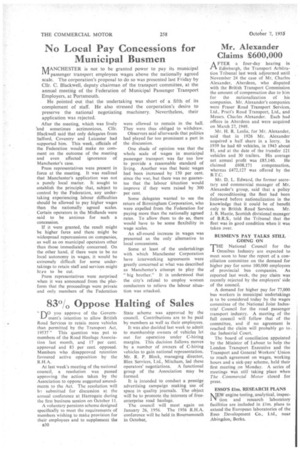No Local Pay Concessions for Municipal Busmen
Page 38

If you've noticed an error in this article please click here to report it so we can fix it.
MANCHESTER is not to be granted power to pay its municipal passenger transport employees wages above the nationally agreed scale.. The corporation's proposal to do so was presented last Friday by
Cllr. C. Blackwell, deputy chairman of the transport committee, at the annual meeting of the Federation of Municipal Passenger Transport Employers, at Portsmouth.
He pointed out that the undertaking was short of a fifth of its complement of staff. He also stressed the corporation's desire to preserve the national negotiating machinery. Nevertheless, their application was rejected.
After the meeting, which was lively 'and sometimes. acrimonious, Cllr. Blackwell said that only delegates from Salford, Coventry and Leicester had supported him. This week, officials of the Federation would make no comment on the outcome of the meeting and even affected ignorance of Manchester's case.
Press representatives were present in force at the meeting. It was realized that Manchester's application was not a purely local matter. It sought to establish the principle that, subject to control by the Federation, any undertaking experiencing labour difficulties should be allowed to pay higher wages than the nationally agreed scales. Certain operators in the Midlands were said to be anxious for such a concession.
If it were granted, the result might be higher fares and there might be widespread repercussions on companies, as well as on municipal operators other than those immediately concerned. On the other hand, if there were to be no local autonomy in wages, it would be extremely difficult for some undertakings to retain staff and services might heft to be cut.
Press representatives were surprised when it was announced from the platform that the proceedings were private and only members of the Federation were allowed to remain in the halt They were thus obliged to withdraw.
Observers said afterwards that politics had played far too prominent a part in the discussion.
One shade of opinion was that the whole scale of wages in municipal passenger transport was far too low to provide a reasonable standard of living. Another was that basic wages had been increased by 150 per cent. since the war, but there was no guarantee that the labour Situation would improve if they were raised by 300 per cent.
Some delegates wanted to see the return of Birmingham Corporation, who were expelled from the Federation for paying more than the nationally agreed rates. To allow them to do so, there would have to be some flexibility in wage scales.
An all-round increase in wages was presented as the only alternative to local concessions.
Some at least of the undertakings with which Manchester Corporation have interworking agreements were greatly concerned at what was described as Manchester's attempt to play the "big brother." It is understood that the city's ref iisal to employ women conductors to relieve the labour situation was attacked.
















































































































